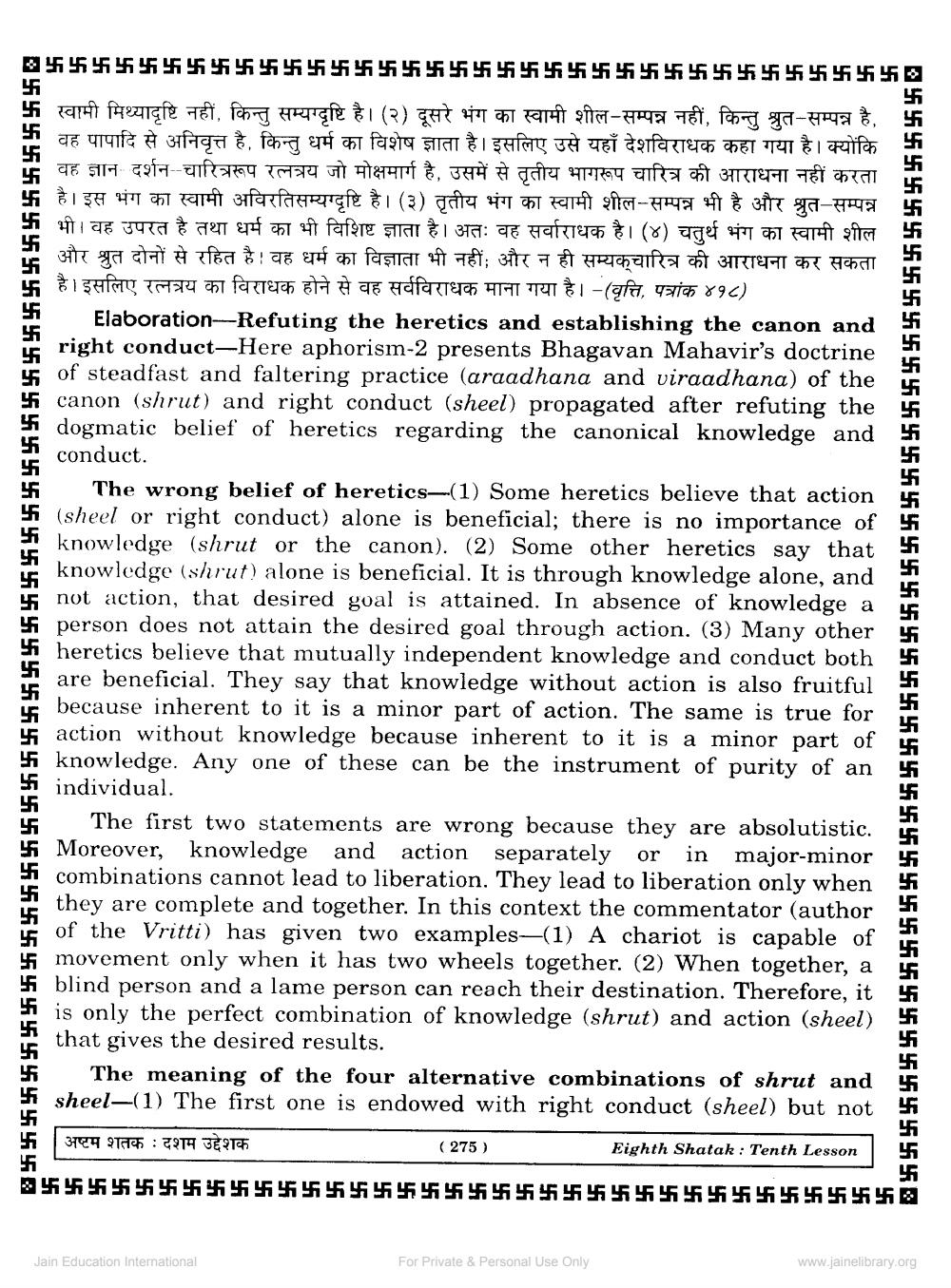________________
455 456 457 455454545454545454545
05454555555555454545555555555555555555555550 卐 स्वामी मिथ्यादृष्टि नहीं, किन्तु सम्यग्दृष्टि है। (२) दूसरे भंग का स्वामी शील-सम्पन्न नहीं, किन्तु श्रुत-सम्पन्न है, 卐
वह पापादि से अनिवृत्त है, किन्तु धर्म का विशेष ज्ञाता है। इसलिए उसे यहाँ देशविराधक कहा गया है। क्योंकि वह ज्ञान दर्शन-चारित्ररूप रत्नत्रय जो मोक्षमार्ग है, उसमें से तृतीय भागरूप चारित्र की आराधना नहीं करता है। इस भंग का स्वामी अविरतिसम्यग्दृष्टि है। (३) तृतीय भंग का स्वामी शील-सम्पन्न भी है और श्रुत-सम्पन्न भी। वह उपरत है तथा धर्म का भी विशिष्ट ज्ञाता है। अतः वह सर्वाराधक है। (४) चतुर्थ भंग का स्वामी शील
और श्रुत दोनों से रहित है ! वह धर्म का विज्ञाता भी नहीं; और न ही सम्यक्चारित्र की आराधना कर सकता 4 guity Traucht FARTECH HÀ TE FORTETO FU TULI - (qfa, zic 896)
Elaboration Refuting the heretics and establishing the canon and right conduct Here aphorism-2 presents Bhagavan Mahavir's doctrine 4 of steadfast and faltering practice (araadhana and viraadhana) of the
canon (shrut) and right conduct (sheel) propagated after refuting the 4 dogmatic belief of heretics regarding the canonical knowledge and conduct.
The wrong belief of heretics-(1) Some heretics believe that action (sheel or right conduct) alone is beneficial; there is no importance of knowledge (shrut or the canon). (2) Some other heretics say that knowledge (shrut) alone is beneficial. It is through knowledge alone, and
not action, that desired goal is attained. In absence of knowledge a 4 person does not attain the desired goal through action. (3) Many other 41 heretics believe that mutually independent knowledge and conduct both i
are beneficial. They say that knowledge without action is also fruitful
because inherent to it is a minor part of action. The same is true for 4 action without knowledge because inherent to it is a minor part of 4
knowledge. Any one of these can be the instrument of purity of an 45 individual.
The first two statements are wrong because they are absolutistic. 45 Moreover, knowledge and action separately or in major-minor combinations cannot lead to liberation. They lead to liberation only when they are complete and together. In this context the commentator (author of the Vritti) has given two examples—(1) A chariot is capable of
movement only when it has two wheels together. (2) When together, a 4 blind person and a lame person can reach their destination. Therefore, it
is only the perfect combination of knowledge (shrut) and action (sheel) that gives the desired results.
The meaning of the four alternative combinations of shrut and sheel-(1) The first one is endowed with right conduct (sheel) but not
454 455 454
| अष्टम शतक : दशम उद्देशक
( 275 )
Eighth Shatak : Tenth Lesson
244 445
446 447 444444444444444444444
Jain Education International
For Private & Personal Use Only
www.jainelibrary.org




